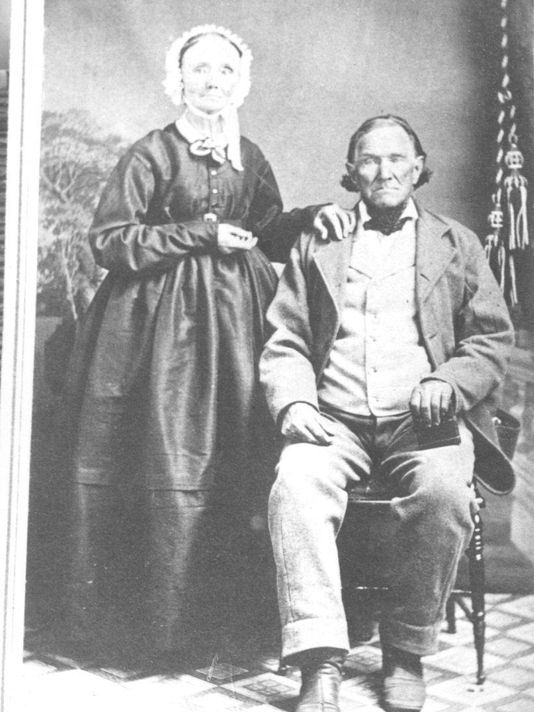Rickrealling

Rickreall pioneers Nathaniel and Lucinda Ford (image credit: Statesman Journal)
The northwest Oregon community of Rickreall is believed to take its name from some of its earliest settlers having been of Canadian French Métis background. It’s agreed that “Rickreall” [don’t click that link if you don’t want to get Rickrealled] derives from le/la/les créole(s) in French.
There appears to be decent documentation for that; I’ve found the place called “La Creole” in a book as early as 1853 (referring to 1846) and in a newspaper by 1867, and different sections of the same stream are called the Rickreall and the La Creole River.
But I don’t think this has been suggested before: I imagine Rickreall or some other version of la créole was a word in Chinuk Wawa.
Mind you, there were synonymous conventional ways to speak of “half-breeds”, such as sitkum sawash (‘half-Indian’).
But a short argument in favor of my idea would point out that this section of Oregon was first settled by ex-fur trade French speakers, who intermarried with Native families and spoke creolized (yes, that’s the linguistic term) Chinuk Wawa at home.
And the foreignization of la créole, turning the first consonant into “R” and generally resulting in a word that’s unrecognizable as French, strikes a chord with the fate of many canadien words that the Jargon introduced to the Pacific Northwest.
- I think of lisitaluy ‘squash’ in Quinault Salish, originally French and near-certainly transmitted via Chinuk Wawa. Source? The rather different-looking la citrouille.
- I also think of tapahote ‘shame!’ in early Chinuk Wawa, known to us from “Manuscript 195” in George Lang’s good book “Making Wawa”. Source? It’s a mutation of t(u) (n’)as pas honte.
- To make the general principle of all this more clear, let me throw an English-sourced example your way: stim kar ‘railroad train’ in Kamloops Chinuk Wawa of 1890s BC. That comes from steam car, which is an otherwise little-known local English expression of that era — previously unknown to us either in Chinook Jargon or in English.
The local linguistic evidence, which I suggest includes “Rickreall”, often leads us to new linguistic-archaeology discoveries about Chinook Jargon’s role in our region’s history.
What do you think?

Always good stuff. I always learn something. Now if Icould learn to string some sentences together. 🙂
LikeLiked by 1 person
Keep at it! I’ve always stuck with the advice to try reading through actual texts in Jargon. Out loud is best. Puzzle your way thru. You can do it!!
LikeLike
Thanks for the plug but it is ironic that, although I came to Wawa via Canadian and Métis French, you were the source of that plausible etymology for “tapahote”.
LikeLiked by 1 person
VERY interesting! One thing, though: In French “créole” (and, in Spanish, “criollo”) originally meant “White person born in the colonies”, and only came to refer to racially mixed individuals at a much later date. There are examples of the former meaning in French in the early nineteenth century, so that it is unclear what its exact meaning must have been in whatever variety of French Chinook Jargon originally got the word from.
Come to think of it, if “sitkum sawash” was available to designate people of mixed blood, perhaps a reflex of “créole” was used to designate locally born Caucasians (and/or Caucasian-looking Métis, perhaps)?
LikeLiked by 1 person
Yes, it’s funny that the earliest instance in a quick Google Books search on créole+canadien is in a translation of Washington Irving! That’s a crude first measure, but probably indicates the rarity of “creole” in Canadian French until pretty late.
Thanks for pointing this out, Etienne!
LikeLike
PS: changing my Google settings to search “in French” doesn’t change these results. Very interesting…
LikeLike